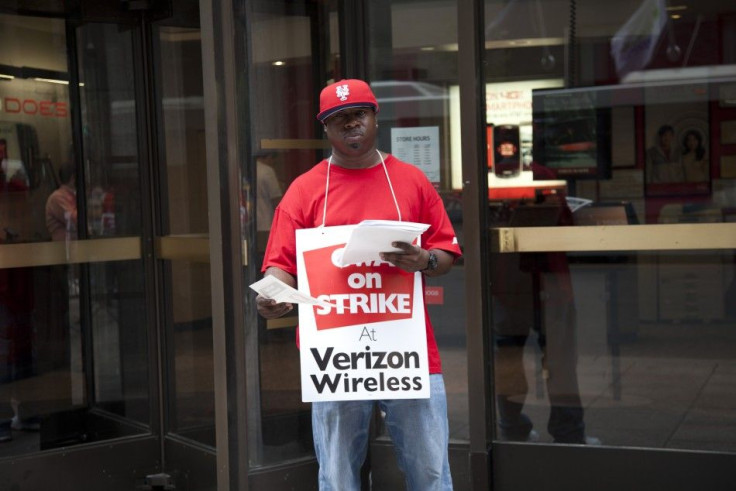Verizon Strike: Striking Workers to Lose Medical Benefits Aug. 31

Thousands of striking Verizon landline workers will lose medical benefits if they remain on the picket line at the end of August, the communications company confirmed.
"I can confirm that the 45,000 striking Verizon workers did receive a letter confirming a provision in their 2008 contract that stated in the event of a strike, medical benefits would be suspended on Aug. 31," said Verizon spokesman Richard Young, according to CNN.
"This should not be a surprise," said Young. "It's part of the contract that they've agreed to."
Verizon said health care will still be available to striking workers through the federally mandated COBRA health insurance program. But employees -- who have generally received company-paid health care -- will have to pay themselves for the COBRA coverage, which can be expensive, especially for families.
Young said "We believe if the striking employees are not serving the customers, our customers should not be expected to pay their benefits."
The company sent out letters this week to the 45,000 striking landline workers, telling them that health insurance and medical benefits will be suspended on Aug. 31 for all still on strike, so that they could make other arrangements. The strike, which began Aug. 7, has been tense, with no end apparently in sight.
The loss of benefits for striking workers could be a major blow, if not a real test, to see how long they can hold out.
"We feel the company is exercising any means possible to make our members suffer in hopes of breaking unity," Chuck Simpson, president of CWA Local 2204 in Salem, Va., told The Wall Street Journal.
The CWA represents about 35,000 of the 45,000 striking Verizon workers.
Interestingly, the company has argued that benefits are the single dividing issue in the labor talks. But striking workers disagree, arguing the company presented them with 100 demands, and that sharing health benefits costs was only one.
"This one is about our survival," Ed Fitzpatrick, president of the International Brotherhood of Electrical Workers Union Local 2222, which represents striking Verizon workers, told the Boston Herald earlier this week.
Fitzpatrick echoed sentiments collected recently by the IBTimes from striking Verizon workers on a Manhattan picket line. Workers said the health benefits issue is merely a smoke screen. The real issue is the future of union landline jobs with Verizon, they said.
Verizon earned 57 cents per share in the second quarter, and the company chairman and CEO, Ivan Seidenberg, claimed it was one of Verizon's "best quarters since the 2008 economic downturn."
But the company's landline business has been in decline for awhile, and Verizon wants to reduce costs. Management is seeking "reasonable" concessions from landline workers in the new contract as a result, the company said.
Amid tense talks, Verizon spokesman has said striking union workers must give concessions on its 100 percent company paid health care plan, and increased flexibility on pensions and the ability to move workers.
Verizon has successfully obtained court injunctions limiting the size of picket lines and accused some striking workers of disrupting the company's work and service flow.
The FBI is investigating reports of sabotage, including the cutting of landline wire by agitated strikers, which reportedly interfered with the phone service of thousands of customers between Virginia and Massachusetts.
Fitzpatrick echoed sentiments of the strikers interviewed and said the strike isn't just about health benefits.
"We are willing to pay for a portion of our health care like everyone else," said Fitzpatrick. "But our members are terrified, and if we accept the contract they offered we will not exist in two years."
Union workers said they are concerned over the company's push to change the contract, allowing it to move workers more freely. Many feel Verizon is simply seeking to gain flexibility in the contract so the union can be wiped away over time, shifting work to non-union workers.
Thus, Fitzpatrick argued that the strike is over Verizon's attempt to eliminate job security for union workers, freezing pensions and effectively union busting.
© Copyright IBTimes 2025. All rights reserved.





















